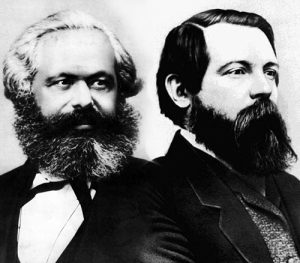Karl Marx and Friedrich Engels were two German socialist philosophers who lived in the nineteenth century. Together, they worked on the principles of communism and spread its doctrines. In 1848, Marx and Engels co-authored and published The Communist Manifesto, a document that laid down the basis for modern communism and one of the most influential political and economic documents in history.
Early Years
In 1842, Engels was sent by his father to Manchester, in England, where he was to work at the Ermen and Engel’s Victoria Mills, which manufactured sewing threads. His father, who owned the business, hoped that working there would change his son’s radical tendencies. Before he headed to Manchester, Engels went to Cologne, to the office of the German newspaper, Rheinische Zeitung. Karl Marx edited the newspaper, and it was in this office that the two revolutionaries met each other.
During his stay in Manchester, Engels wrote an article called “Outlines of a Critique of Political Economy” and sent it to Marx for publication. Marx had it published the following year in the journal Deutsch–Französische Jahrbücher. Engels closely observed the poor people’s conditions in Manchester and was horrified by their deplorable living conditions, child labor, and excessive work demands placed on them. He wrote more articles and sent them to Marx, who published them both in the Rheinische Zeitung and the Deutsch–Französische Jahrbücher. Engels later put together these articles and published them in book form in 1885, under the title “The Condition of the Working Class in England.”
In 1847, the Communist League appointed Marx and Engels to write a draft of the communist doctrines and policies. The following year, the two came up with the pamphlet entitled “Manifest der Kommunistischen Partei,” famously known as the Manifesto of the Communist Party. The work, which would become one of the most influential documents in history, contained Engel’s early ideas but mostly expressed Marx’s views.
The Revolutions of 1848
During the Revolutions of 1848, Engels and Marx took the opportunity to dive headlong into a revolution and test themselves as revolutionaries. They ultimately aimed to turn the revolution into a communist triumph using the newspaper Neue Rheinische Zeitung. The revolution was an effort by the German states to topple the authoritarian political rule and to put a representative government in its place. Engels and Marx published articles that hurled criticisms against the politicians and the government. The revolution failed to achieve its purpose, so Marx and Engels found themselves in London. The Communist League was reassembled in the latter part of 1849, and Marx and Engels formulated more plans and policies for the communists, anticipating that there would be another uprising.
Funds for the Movement and Nature of the Partnership
Engels soon became concerned about the movement’s funds, which were drained by then. He decided to return to his work at Ermen & Engels in Manchester to generate funds. Soon, he became a partner in the business and started generating money. All the while, he did not let his communist beliefs and hatred of capitalism bother him. As a result, he was able to send money to Marx regularly. In 1869, Engels sold his share of the business, which brought him a huge amount of money. This money allowed him to live in financial security for the rest of his life. He was also able to supply Marx with £350 in yearly grants.
While in Manchester, Engels regularly wrote letters and articles to Marx, who lived in London. Engels wrote articles published in the New York Tribune, and in 1896, these articles were published as Revolution and Counter-Revolution in Germany in 1848. In the partnership between the two men, Engels was the one who had more knowledge of military concerns, nationality, and the sciences. Consequently, Marx often consulted him on matters about the economy. While Marx was the more natural theoretician, Engels was the more talented writer. Marx often relied on Engels’ literary talent to spread their ideas.
Engel’s Role After Marx’s Death
After Marx died of bronchitis in 1883, Engels became the leading expert on the ideas they collaborated on and developed. These ideas eventually became known as Marxism. Engels concerned himself with more writings on various matters, aside from writing introductions to later editions of Marx’s writings. Engels also consulted his partner’s drafts and uncompleted writings, and from these, he produced the second and third volumes of Marx’s Das Kapital.
During the remainder of his life, Engels enjoyed a kind of adoration from circles that supported Marxist theories. However, along with this adoration came harsh criticism from those who disagreed with his and Marx’s ideas. Engels became recognized and respected in the Soviet Union and other communist nations, and later historians simply mentioned his name as a seeming afterthought to Marx’s. However, some scholars argue that Engels’ role in the partnership deserves more serious consideration and study. Still, another group of scholars contends that some changes in original Marxist ideas were caused by Engels’ writings. Some scholars counter these theories about distorted Marxist ideas by pointing out that, in his last years, Marx himself did not know of any changes in his and Engels’ theories. This claim is supported by the letters that were exchanged between the two revolutionaries. These letters contain intimate collaboration that existed between Marx and Engels while they drew up their theories.
